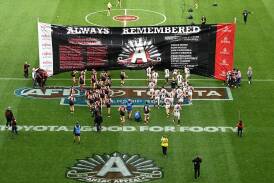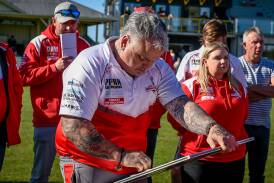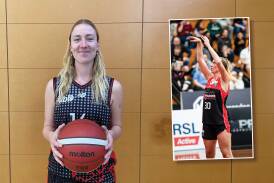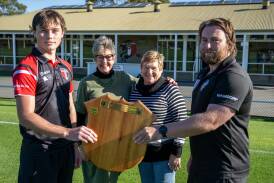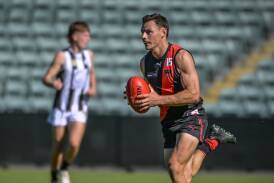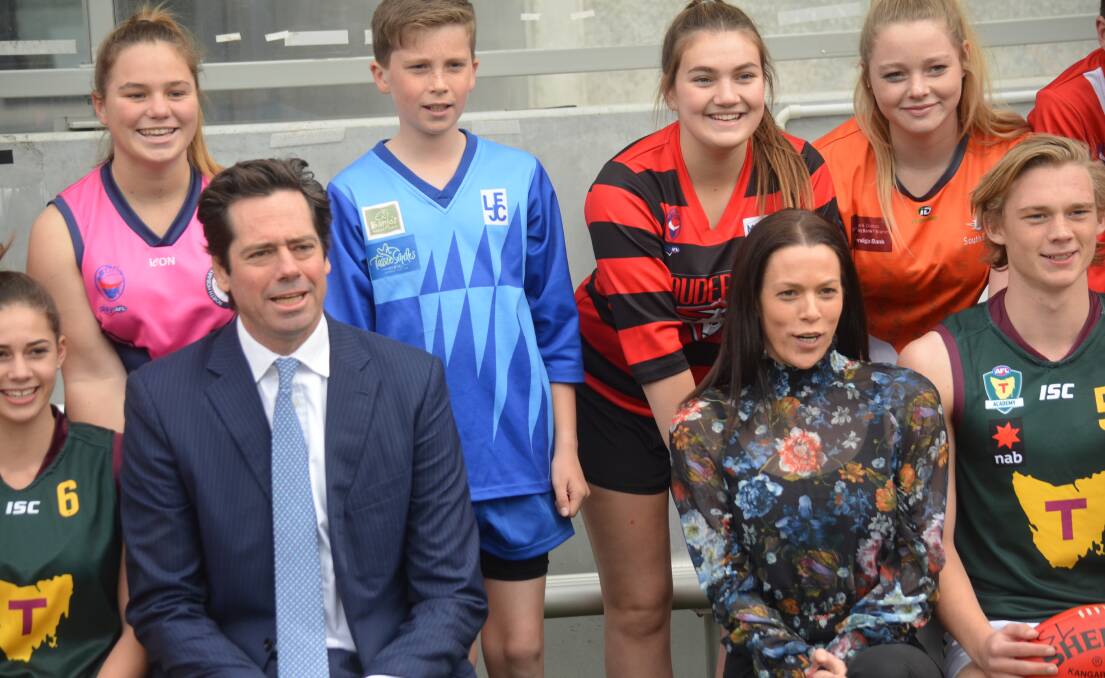
The pipedream of a Tasmanian AFL team is contingent on the state cleaning up its “fractured and fragmented” football landscape over the next “three to five years”, AFL boss Gillon McLachlan says.
Subscribe now for unlimited access.
$0/
(min cost $0)
or signup to continue reading
Unveiled in Hobart on Tuesday, the McLachlan-led steering committee’s plans to strengthen Tasmania’s talent pathways and unite the football community have been met by a mixed reaction.
Key initiatives, devised over the past three months, include a $1.4 million funding increase in 2019 to lift junior participation levels, the establishment of regional administration hubs and community football advisory commissions, a provisional Tasmanian VFL licence for 2021, expanded junior pathways from under-12 to under-18s and full-time boys’ and girls’ TAC Cup programs.
The Tasmanian State League’s future has also been reassured and all state programs will be re-branded under a name to be determined by the public.
“I can’t make any guarantee or promises. Tasmanian football is fractured and fragmented, our talent pathways are fragmented, the community football interrelationships aren’t working and we’ve dropped the ball on game development,” McLachlan said.
“It’s clear that there are some challenges and in order for football to prosper in one of our founding footy states, we need the help from the Tasmanian football community to help create the solutions – it needs to be a team effort.
“Over the next three years our vision is to rebuild and unify Tasmanian football.
“We will bring all this together through an advisory board representing all three regions of the Tasmanian football community to work with the AFL to develop the TAC Cup and VFL operating models.
“Today is a step in the right direction, a clear plan that speaks to all levels of community football with unprecedented funding.”
McLachlan said all initiatives would be funded by the AFL with next year’s additional funding rise to be backed up with incremental payments in 2020 and beyond.
COMMUNITY SETUP
Three football administration hubs in the South, North and North-West will be created to reduce the burden on volunteers. McLachlan said they would be responsible for “the day-to-day running of the competitions, including fixturing and tribunal, along with managing of the policy and education programs”.
Regional advisory commissions, similar to those that operate in Victoria, will be established to deal with community issues, while affiliation agreements will be developed with associations to “enable a consistent, integrated approach to governance support and AFL funding across the state”.
However, the Tasmanian Football Council’s future remains in doubt with its future to be negotiated.
TSL FUTURE
McLachlan said the TSL, a Tasmanian VFL side and full-time development programs can co-exist, and defended the committee’s decision not to significantly increase funding for the competition.
TSL clubs will receive $3000 more in 2019 but lose valuable transport subsidies and have to meet key performance indicators.
They will also have to engage with their community zones by running programs such as school clinics.
AFL Tasmania chief executive Trisha Squires said she would be meeting one-on-one with the seven remaining presidents in the next fortnight to develop individual club KPIs.
VFL LICENCE
AFL Tasmania will lead a VFL provisional licence advisory board which will work towards delivering a sustainable model for entry in 2021 – mirroring Frankston’s licence application in 2017.
While the AFL has agreed to part fund a Tasmanian side, Squires said Tasmanians would need to develop income-sponsorship, establish a board, find a coach and ensure a competitive side was fielded.
She said list depth would be built through Tasmania’s TAC Cup entry next year.
TALENT PATHWAYS
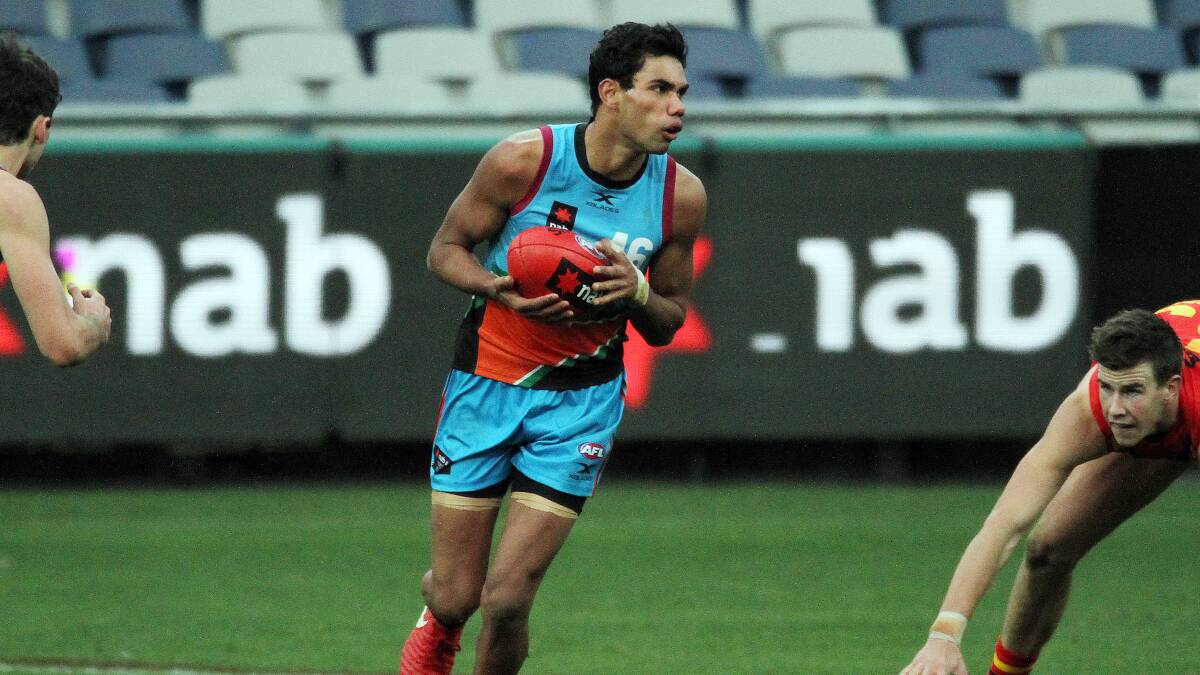
Tasmania’s development programs will be extended to include under-12s through to under-18s with youth to be given more exposure to intrastate competitions and state selection for national carnivals.
Player levies will also be removed with a full-time under-18s Tasmanian team to enter the TAC Cup in 2019. It will be be supported by a full-time coach and regional coaching groups.
A girls’ equivalent will start in 2019 with a “new full-time resource” to be dedicated to female talent pathways.
A talent manager will also be employed in the North-West Coast for the first time.
AFL FUTURE
The Tasmanian government’s deals with Hawthorn and North Melbourne to play matches in the state were not pat of the committee’s brief, but McLachlan said decisions on those deals, which expire in 2021, would become clearer in the next “six or seven months.”
He said a Tasmanian AFL licence was someway off but could be revisited if the announced plans and unification were achieved.
AFL plans just a ‘diversion’, says Brady
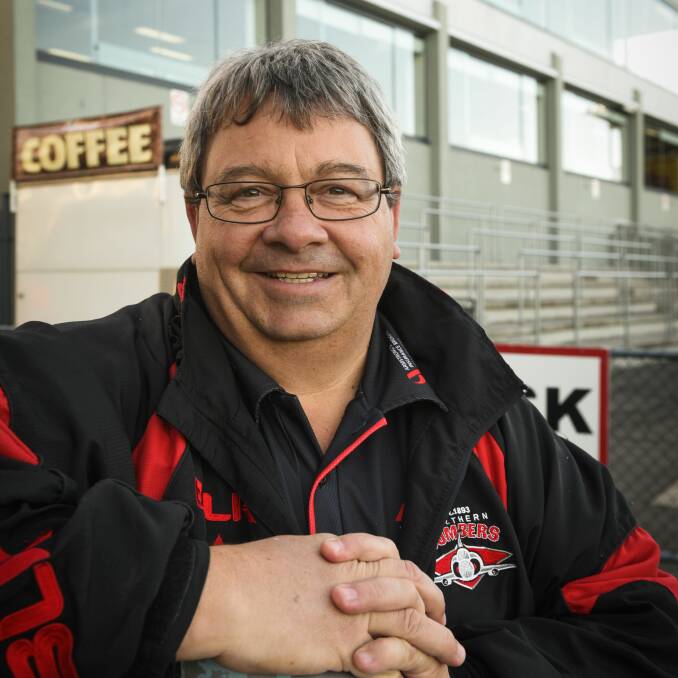
Outspoken Tasmanian football advocate and North Launceston president Thane Brady says Tuesday’s AFL announcements should have already been in place.
Brady, who went head-to-head with the steering committee in defence of the Tasmanian State league in May, said all plans were meaningless without AFL House committing to a date for a Tasmanian team in the national competition.
“Gil McLachlan got past the sniffer dog today at the airport as all he brought were a carrot and crumbs off the board table,” Brady said.
“There is an extra $1.4 million for programs that should have already been in place and the dangle of the carrot for the possibility of a 2021 VFL side with conditions we must show unity across the state, but no growth plan for TSL.
“There is no plan to bring North-West representation into TSL ASAP.
“How can we possibly demonstrate unity and be VFL-ready when the AFL won’t invest in a NW team in the TSL?
“Many will see this as a set-up and a diversion tactic to take our eyes off our Tassie AFL team ambition.”
When asked if all TSL presidents were happy with the outcomes, AFL chief executive Gillon McLachlan told media it was impossible to please everyone.
The TSL’s future at times throughout the steering committee’s investigations appeared shaky but McLachlan said everyone was committed to supporting a viable State League with clubs invested in their communities.
North-West representation is unlikely in the immediate future but McLachlan said it remained a priority.
“Sometime the best you can hope for in my job is that everyone is equally unhappy,” he said.
“Thane’s grumpy all the time. I reckon he does a lot of slow dancing with his sister, he needs to get out more.”
Brady said he could live with being labelled grumpy and would continue to fight for a better outcome for football in Tasmania.
“We are not an outpost of Melbourne – Tasmania is a full member of the Commonwealth of Australia yet the AFL continues to deny us a fair go,” he said.
“It can never truly be the AFL without Tasmania having its own licence.
“It’s time for Tasmanians to rally against this continued unacceptable treatment.
“Tasmanians need to form a strong working group to mobilise our state in tackling the AFL head on about our own Tassie team in the AFL.
“Being called grumpy is better than being known for going weak at the knees or turning and running when the heat comes on.
“Standing up to the AFL and making them accountable for their treatment of Tasmanians is not something I’m going to stop just because the AFL are now trying to do a character assassination.”
The committee comprised of McLachlan, AFL Tasmania boss Trisha Squires, Carlton coach Brendon Bolton, former St Kilda captain Nick Riewoldt, and AFL staff Rob Auld, Simon Laughton, Tristan Salter, Marcus Ashcroft and Andrew Gennai-Garino.
Community issues remian: Reynolds
The Tasmanian Football Council’s chairman says he is concerned grassroots issues have not been addressed in the steering committee’s plan for the state.
Paul Reynolds, who also heads the NTFA, said he wasn’t immediately convinced by Tuesday’s announcement from AFL chief executive Gillon McLachlan.
“Mr McLachlan has made a number of announcements and some of them I’d like to take time to find some more detail about - particularly in relation to the community football component of the funded hubs,” Reynolds said.
“But I didn’t get the feeling that the issues relating to grassroots football and community football had been properly addressed.”
RELATED: Don’t forget community football
McLachlan dodged questions about the council’s role going forward, saying its future would be decided in the coming weeks.
The council began life in 2009 with the re-introduction of the State League and has been working in partnership with AFL Tasmania since 2014.
“I think (the council is important) now more than ever if we’re going to try and strive to have a VFL team and a Mariners team and ultimately an AFL team, which I think is what the Tasmanian people want,” Reynolds said.
“We’ve got to get it right at the base level because that’s where we get so much feeder from.
“It’s a dangerous thing to build something on a shaky foundation and I'm not certain that has been addressed.”


